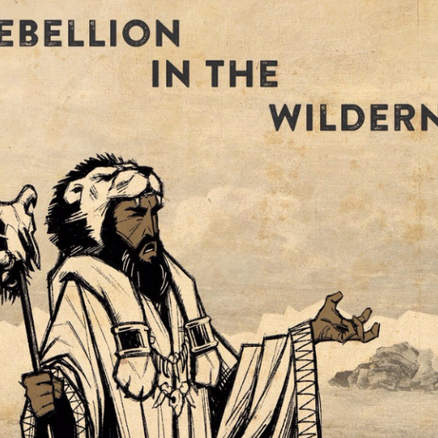
Exodus 19-40
God invites Israel into a covenant relationship at Mount Sinai. But Israel rebels immediately. How will they become God's covenant partners?
Script
Introduction [00:00-00:30]
Jon: The first half of the book of Exodus tells the story of ancient Israel being rescued from slavery. And when people say “the Exodus story,” those are the chapters they are referring to1.
Tim: But the book has a second half, where Moses gives the ten commandments to Israel, along with these instructions about building a sacred tent.
Jon: And what links these two halves together is this crucial story. The people of Israel, they’re out in the middle of nowhere. They find themselves at the foot of this mountain called Sinai, and here God’s presence comes dramatically down in the form of a violent storm cloud.
God’s Presence with his People [00:31-02:36]
Tim: Now, let’s stop a second and talk about the concept of God’s presence because it’s really important for the rest of the book. At the beginning of the Bible, in the garden of Eden, humanity was in God’s presence. They had this close relationship with him and it was good2. But humanity rebelled, and the relationship fractured, and access to God’s presence is lost3. But God promised Abraham that he would restore his blessing to all of the nations, and that includes this restoration of relationship and access to God’s presence4.
Jon: So here at Sinai, God’s presence is now right here in front of them, and it is actually quite frightening. And he’s here to invite Israel into this unique and close relationship with him5.
Tim: And the word used to describe this relationship is “covenant.” It’s like a legal agreement between God and Israel. And it’s unique because, up until now, God hasn’t asked Israel to do anything in return—just to trust him. But here on the mountain, God is going to ask Israel to do something––a lot of things actually. He gives them a whole set of laws that includes the ten commandments, and if they obey these commandments, they will become the people who will represent God to the nations of the world6.
Jon: Like a priest would.
Tim: Yeah. In fact, that’s what God calls them to become, “a kingdom of priests.”7 And this is all connected back to the promise to Abraham that his family would become a blessing to the nations8.
Jon: Okay, but obeying these laws is going to be difficult because there’s a lot of them and they set a really high standard.
Tim: Though if you think about it, I mean, of anybody in the world who should be able to do it, I mean, it’s these people who experienced firsthand God’s grace and his power when he rescued them from slavery.
Jon: And they agree to obey the terms, but then they refuse to go into God’s presence because it’s, well, it’s still a bit frightening9
TIm: And since the people won’t go up, Moses goes up to the mountain by himself to meet with God10. But God still wants to be with all of his people, and so he says, “Okay, if the people won’t come up here to me, I’ll come down off this mountain to be with you all.” And that’s why he orders Moses to build this elaborate tent as a place where God’s presence can be among his people.
The Tabernacle [02:37-03:04]
Jon: And that’s why the next thing we get is seven chapters of extremely detailed architectural blueprints for this tent. It’s really, really, really long.11
Tim: But every detail is important and has some kind of symbolic value. For example, there’s all this garden of Eden imagery inside the tent. And it’s to remind you that when you are in the tent, you are in God’s presence.
Jon: Then we get another six chapters describing how they build the tent, which is really just repeating the same blueprints word for word.
The Golden Calf [03:05-04:01]
Tim: Now let’s back up because before the tent is finished, there’s this super important story. Moses is coming off the mountain with the ten commandments and the blueprints in his hands, and he finds Israel breaking the first two commands of this covenant.
Jon: “Don’t have any other gods before me,” and “don’t worship idol statues.”12
Tim: Right, and so here we are. Immediately after agreeing to the covenant, they are throwing this ritual party. They’re worshiping an idol13. And so God says to Moses, “You know what? This is not going to work. I should just wipe these people out and start over with you.”
Jon: But Moses reminds God of his promise to Abraham and pleads with God to spare them14, which is a really weird conversation. Why would God need to be reminded of something?
Tim: Yeah. It does seem odd, but this dialogue is inviting us into God’s experience of grief and pain due to Israel’s actions. And he really could walk away, but instead, this God chooses faithfulness to his own promises, even though he knows it’s going to cost him.
Moses and the Tabernacle [04:02-04:38]
Jon: So we come to the end of the book. The tabernacle is built. God’s presence comes down off the mountain to fill it. And in the final scene, Moses goes to enter the tabernacle to be in God’s presence.
Tim: But he can’t. He’s actually not able to go inside, and that’s how the book ends.
Jon: Why can’t he go in? That was the whole point.
Tim: So when Israel worshiped the golden calf, it was like a slap in the face to God’s faithfulness. And so Moses can’t just waltz into the tent like everything’s just fine. There’s a deeper problem still in this relationship.
Jon: Will they ever be able to fix the relationship and go into God’s presence?
Tim: Well, that’s what the next book, Leviticus, is all about.
Related Content




/God/god_rich.jpg?tr=q-65,w-438,h-438)




